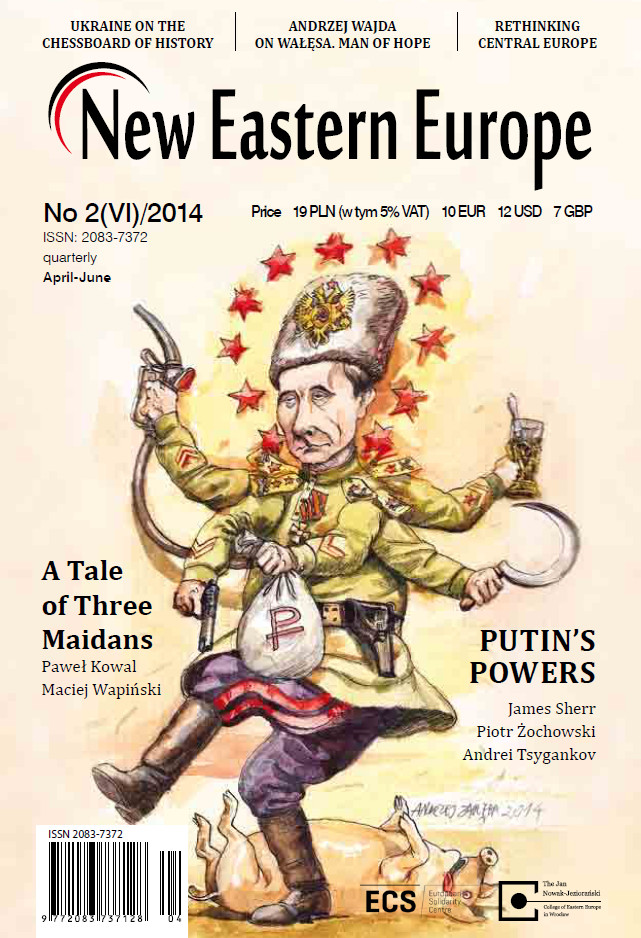2 (XI) 2014: Putin’s Powers
March 28, 2014 -
Adam Reichardt
-
Issue

Issue 2 (XI) / 2014: PUTIN’S POWERS
The events that have unfolded in the region of Eastern Europe in the first few months of 2014 have brought attention to a region which, not that long ago, was referred to as “Europe’s unwanted child”. Undoubtedly, the rapid pace of changes requires equally rapid reactions from both the media and policymakers that are well-informed and free from preconceptions and simplifications in order to can avoid a further escalation of conflict. Keeping this goal in mind, the spring 2014 issue of New Eastern Europe offers a selection of texts on the situation in Eastern Europe from multiple perspectives: experts, journalists, activists and politicians, living both in and outside the region.
A block of texts titled “Putin’s Powers” looks at various aspects of Russian power and influence in the world today. James Sherr, British analysts with the London-based Chatham House and author of the widely discussed book Hard Diplomacy and Soft Coercion: Russia’s Influence Abroad, offers an acute breakdown of Russia’s soft power strategy. Polish expert, Piotr Żochowski, analyses the Russian internal security apparatus and its mechanisms, while San Francisco-based professor of political science, Andrei P. Tsygankov, explains how Russia’s emphasis on its distinct civilizational values drives Putin’s foreign policy agenda. Lastly, Lithuanian philosopher and human rights’ activist, Leonidas Donskis, asks the question – Is the Russian language a failed lingua franca of Eastern Europe?
The issue opens up with several analyses on the situation in Ukraine. Paweł Kowal and Maciej Wapiński, in their tale of the three Maidans, show how the latest Ukraine’s revolution was a continuation of two earlier upheavals after the fall of the Soviet Union. In an interview with the Mayor of Lviv, Andriy Sadovyy, the politician describes Ukraine’s European identity and what it will take to modernise the state. In a thought-provoking piece, Ukrainian journalist, Milan Lelich, depicts the two mentalities that exist in the country: in the east and the west, whereas civil society activist Halyna Senyk sketches the immense corruption that plagued Ukraine during the Viktor Yanukovych presidency.
The issue also includes two articles that discuss the concept of Central Europe, revisiting Milan Kundera’s seminal essay “The Tragedy of Central Europe”, in the context of the region today.
To see the table of contents and a preview of the issue:
-
An interview with Polish film director Andrzej Wajda
-
A discussion on Poland’s NATO membership, 15 years after the country’s accession
-
A report on Armenia’s painful pension reforms
-
An analysis of nationalism resurging in Hungary
-
An interview with David Usupashvili – Speaker of the Georgian Parliament
-
Much more, including book and film reviews on the latest from and about the region
The issue is available digitally on ipads and GooglePlay:
To contact the editors for more information about the issue or for commentary on the current situation in the region: editors@neweasterneurope.eu
New Eastern Europe is the exclusive English-language quarterly news magazine dedicated to Central and Eastern European affairs. The magazine is published in Poland with international distribution to over 40 countries. It is co-published by the non-profit Jan Nowak-Jezioranski College of Eastern Europe and the European Solidarity Center.




































